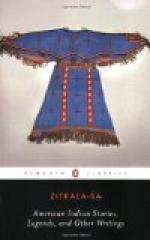I had expected her to run out to greet me, but she stood still, all the while staring at the weather-beaten man at my side. At length, when her loftiness became unbearable, I called to her, “Mother, why do you stop?”
This seemed to break the evil moment, and she hastened out to hold my head against her cheek.
“My daughter, what madness possessed you to bring home such a fellow?” she asked, pointing at the driver, who was fumbling in his pockets for change while he held the bill I gave him between his jagged teeth.
“Bring him! Why, no, mother, he has brought me! He is a driver!” I exclaimed.
Upon this revelation, my mother threw her arms about me and apologized for her mistaken inference. We laughed away the momentary hurt. Then she built a brisk fire on the ground in the tepee, and hung a blackened coffeepot on one of the prongs of a forked pole which leaned over the flames. Placing a pan on a heap of red embers, she baked some unleavened bread. This light luncheon she brought into the cabin, and arranged on a table covered with a checkered oilcloth.
My mother had never gone to school, and though she meant always to give up her own customs for such of the white man’s ways as pleased her, she made only compromises. Her two windows, directly opposite each other, she curtained with a pink-flowered print. The naked logs were unstained, and rudely carved with the axe so as to fit into one another. The sod roof was trying to boast of tiny sunflowers, the seeds of which had probably been planted by the constant wind. As I leaned my head against the logs, I discovered the peculiar odor that I could not forget. The rains had soaked the earth and roof so that the smell of damp clay was but the natural breath of such a dwelling.
“Mother, why is not your house cemented? Do you have no interest in a more comfortable shelter?” I asked, when the apparent inconveniences of her home seemed to suggest indifference on her part.
“You forget, my child, that I am now old, and I do not work with beads any more. Your brother Dawee, too, has lost his position, and we are left without means to buy even a morsel of food,” she replied.
Dawee was a government clerk in our reservation when I last heard from him. I was surprised upon hearing what my mother said concerning his lack of employment. Seeing the puzzled expression on my face, she continued: “Dawee! Oh, has he not told you that the Great Father at Washington sent a white son to take your brother’s pen from him? Since then Dawee has not been able to make use of the education the Eastern school has given him.”
I found no words with which to answer satisfactorily. I found no reason with which to cool my inflamed feelings.
Dawee was a whole day’s journey off on the prairie, and my mother did not expect him until the next day. We were silent.




